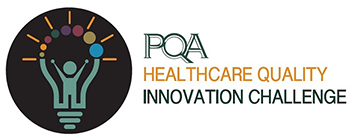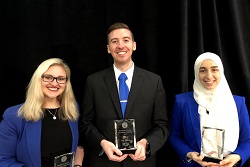Q&A with PQS CEO Jeff Newell on the Healthcare Quality Innovation Challenge
 The PQA Healthcare Quality Innovation Challenge (HQIC) is an annual national collegiate competition where student teams present technology-enabled solutions to improve healthcare quality. With the support of a faculty or pharmacy professional mentor, participating student teams develop a business summary proposal for their solution to one of three prompts provided by PQA. The prompts for the 2020-21 academic year are focused on pandemics, mental health and the social determinants of health.
The PQA Healthcare Quality Innovation Challenge (HQIC) is an annual national collegiate competition where student teams present technology-enabled solutions to improve healthcare quality. With the support of a faculty or pharmacy professional mentor, participating student teams develop a business summary proposal for their solution to one of three prompts provided by PQA. The prompts for the 2020-21 academic year are focused on pandemics, mental health and the social determinants of health.
Jeff Newell, CEO of Pharmacy Quality Solutions (PQS), participated in a Q&A with PQA about HQIC on August 20. He shared his insights on the competition, what makes it special and some tips this year’s students may want to consider as they develop their proposals. PQS has sponsored HQIC since its creation in 2017.
 The Healthcare Quality Innovation Challenge (HQIC) is a student competition. What makes it unique and special?
The Healthcare Quality Innovation Challenge (HQIC) is a student competition. What makes it unique and special?
I have always felt the unique thing about HQIC was its multi-disciplinary approach, where we encourage students to collaborate across disciplines, like business and technology. I think it is so important for young pharmacists to learn early on that problem-solving must be collaborative because that’s how organizations work in the real world.
PQS has sponsored HQIC since it was created. Why is PQS a supporter of this competition?
I think when you engage students early on, they become better practitioners later in their careers. Many front-line pharmacists are not taught how to make a difference in the quality of care that patients receive. The current reimbursement model focuses heavily on key quality measures where reimbursement may change based upon performance scores.
What is the most impressive or exciting thing you have seen in the competition so far?
There are some really smart people out there! I continue to be assured that the pharmacy profession is attracting some of the most talented, articulate, and poised young professionals out there. I can retire knowing our profession is in good hands!
What advice would you give students who will participate in this year’s competition?
I would say be collaborative. Work outside of your comfort zones. Try to solve a real problem. Look at the problem from different vantage points: from the patient’s perspective, a quality perspective and from a business standpoint.
 In terms of partnerships, what types have the potential to be most impactful? What seems to be the most valuable?
In terms of partnerships, what types have the potential to be most impactful? What seems to be the most valuable?
Again, I return to the importance of collaboration. It is important to work with other healthcare practitioners, patients, business professionals and the technology experts. Problems cannot be solved in a vacuum. Create partnerships where a problem is uncovered, understood, and solved.
What new ideas do you think will shape our profession as a result of COVID-19?
How fast and easy can we get accurate information? Can we still produce high quality work in the virtual world? Will point of care testing become more commonplace and covered under insurance reimbursement? Also, we see that people are staying away from doctors and hospitals because they are fearful of being exposed to the virus. There needs to be continued focus on creating telemedicine opportunities for patients that are easy, productive, and helpful so that other health concerns are not overlooked.
